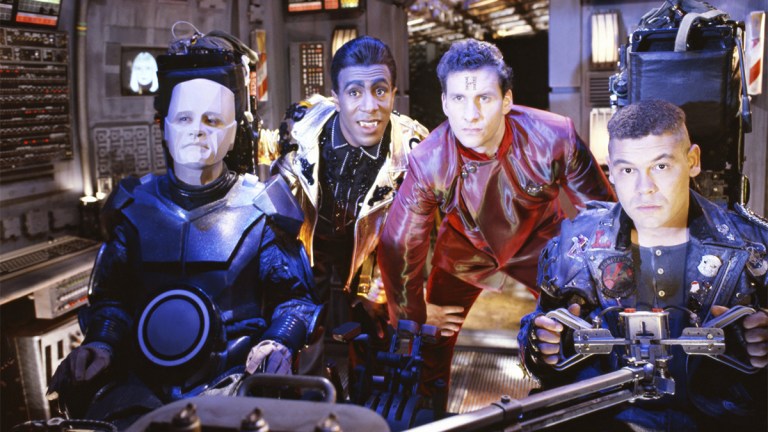Red Dwarf Already Had the Perfect Ending in 1993
New Red Dwarf episodes are rumoured to be on their way, but no future finale could beat the one that aired back in the 1990s.

After a gap of a few years and a messy-yet-secretive legal dispute between creators Doug Naylor and Rob Grant, Red Dwarf is rumoured to be back on its way to our screens once again with three new episodes. Which poses the question – how many more returns can it make before it finally draws to a close? How will the TV series that started with a pilot episode called “The End” end?
Red Dwarf is unlike any other science fiction franchise of comparable longevity. It is not like Stars Trek or Wars, an expansive universe full of side characters and unexplored domains for spin-offs to inhabit. Nor is it the adventure of a single character whose face changes on a semi-regular basis.
As part of the ongoing mysterious feud settlement, Rob Grant is launching Red Dwarf: Titan, which is set to give us a prequel/alternate universe take on Lister and Rimmer. Boiling the show down to its main Odd Couple pairing and putting them in a second-hand Weyland Yutani setting rather than the Gelfs, Simulants and Psi-Moons of the original show’s deep future setting opens up some interesting possibilities.
But Red Dwarf itself is definitively the story of four specific characters (Sorry, Kochanski), played by four specific actors who cannot be simply recast on a whim (Sorry, Chloë Annett) and those actors are all getting on a bit. At some point, the story is going to have to resolve, or Red Dwarf is going to join the ranks of Space 1999’s Moonbase Alpha, the original Lost in Space’s Jupiter 2, Other Space’s UMP Cruiser, The Canterbury Tales’s pilgrims, and Sliders’ Sliders – travellers trapped on forever unfinished voyages.
Red Dwarf X’s “The Beginning” and Other Endings
With a show whose future has been as frequently uncertain as Red Dwarf’s, there have already been several attempts to give the story a high note to end on.
The last episode of Red Dwarf X, titled “The Beginning” seems like a fitting bookend. Rimmer discovers that his biological father was the family gardener, meaning that rather than being a failure he’s upwardly mobile. This breakthrough allows him to do what he’s always dreamed of, become a true leader to the Red Dwarf crew and successfully command the ship in battle. Then the episode’s final line, echoing Lister’s at the end of ahem, “The End”, is “The slime’s coming home!”
Even the end of the special Back to Earth, with its meta visit to “our” reality and Lister’s renewed sense of purpose in pursuing his (doomed, I’m sorry) quest for Kochanski, would have worked as a fond farewell.
But the truth is, the episode that would have made the perfect final ending for Red Dwarf is also the last episode Rob Grant and Doug Naylor wrote together, and it’s a cliffhanger.
The Perfect Ending: 1993’s “Out of Time”
“Out of Time” is the final episode of season six. The plot is that the crew of Starbug have lost all trace of Red Dwarf, they are hopeless, irritating each other, and lost in space. Then they stumble across a field of “Reality Bubbles”, laid out to protect a prototype spaceship with its own time travel device. No sooner have to crew determined that this drive is useful for no more than a trip to medieval deep space, than their future selves turn up. Present and future selves don’t get on, there’s a fight, and the whole episode ends on a cliffhanger with Starbug exploding just as Rimmer fires a bazookoid at the time drive.
But what this episode does better than maybe any episode of the series is resolve the war going on at the soul of Red Dwarf between the two shows it wants to be.
One of those shows is a traditional bunk bed sitcom whose closest relatives are probably the Ronnie Barker-starring prison sitcom, Porridge or the long list of “Neat guy/slobby guy” Odd Couple sitcoms. It is a show set in a universe that lasts for 30 minutes. Any lessons learned during those 30 minutes are quickly forgotten by the next episode because the characters need to reset to type to preserve the “sit” that fuels the “com”.

The other show is a science fiction drama that happens to have jokes in while asking questions about the nature of the self, destiny, justice and reality. It is a science fiction universe with rules as well, one quite unlike anything in even serious science fiction. It is a post-human universe where humanity was the only intelligence to ever arise, leaving the Dwarf crew to pick through the ruins of a civilisation that grew, prospered, spread and died out billions of years ago, leaving only deranged AIs and genetically modified organisms in its wake.
At various points in Red Dwarf’s history, each of these shows has managed to wrestle control of the steering wheel, and both of them have managed to produce some truly stellar episodes, but “Out of Time” shows the latter show winning a final victory. It shows the crew finally breaking out of their Sitcom Law assigned roles for one brief second, and it costs them everything.
In Space, You Can Only Hear Yourself Scream
The reason that the two shows, the Odd Couple sitcom and the sci-fi drama, have managed to cohabit so well over the years is that both stories are ultimately about character. In a vast and empty graveyard universe, the crew are forced to reckon with each other and themselves.
Throughout the show, especially those first six seasons, the crew has frequently had to encounter themselves. Episodes like “Me2”, “Psi-Moon” and “Rimmerworld” confront Rimmer with the fact that the person he most despises is himself. Episodes like “Confidence and Paranoia”, “Demons and Angels”, “Polymorph” (I and II) and “Legion” show the crew literally fighting their worst natures, while episodes like “Parallel Universe”, “Dimension Jump” and “Back to Reality” force them to see themselves from disturbing new perspectives. Kryten, meanwhile, is constantly fighting to break the programming that makes him selfless, subservient and unable to lie, happily oblivious to his own frequent bouts of snobbishness, jealousy and outright pettiness. Even Cat is forced to reckon with himself when he encounters the pleasure GELF in “Camille” and discovers he is his own ideal mate (because he is secretly the best character).
So, if Red Dwarf were to ever have a finale, that finale would have to show the crew defeat the show’s Big Bad, and Red Dwarf’s Big Bad has always been the crew of Red Dwarf.
And this is what “Out of Time” does perfectly. At first glance, it might appear to be two different episodes. The first half is about the reality bubbles, the second is about the Time Drive. But it all comes down to the crew’s unending rivalry with itself.
It opens with Rimmer, as a self-appointed “morale officer” singling out each member of the crew to point out how much he hates them, while also spotlighting his character in a way that each of the crew is during the episode. As they enter the Reality Bubble field Kryten gets a fantastic mini-plot arc when it seems like Lister is actually a disguised fugitive mechanoid, while Cat is forced to face his worst fear (not being the centre of attention for a brief period of time).
All of these scenes serve to reinforce our idea of the characters, and their situation (the one of the comedy comes out of). Both the characters and the situation are static and unchanging. And then we meet the Dwarf’s future selves.
Defeating the Big Bad
The Future Dwarfers aren’t “evil”, not in any moustache-twirling, conquering-the-universe sense (as we’ve mentioned – not much universe to conquer). They are recognisably the characters we know, the Cat is vain, Kryten is uptight, Rimmer is Rimmer. But they are no longer bound to the void of space, they can go anywhere and anywhen. So they’ve immediately gone to indulge in the best the spacetime continuum has to offer, which is usually in the hands of the very worst villains in history.
The Dwarfers are confronted with what they will become, what the endpoint is of sticking to their Sitcom Law Assigned Roles, and they rebel. Best of all, the leader of that rebellion is Rimmer, in full knowledge that it’s a hopeless cause. The crew come together and aspire to be better people than they are, and when that ends with Rimmer watching his crew die around him, it isn’t funny at all. Rimmer’s last moments are genuinely desperate and, in a way the show has never managed since, genuinely heroic. In those moments, Rimmer and the crew seem like they are ready to become something else, and so Sitcom Law reasserts itself, and they explode.
Rimmer has never quite achieved that sense of growth and chance again. The show has tried, in “The Beginning”, in “The Promised Land” when he gets superpowers, and in “Stoke Me A Clipper” where he actually becomes Ace Rimmer, but all of these feel like aberrations before Rimmer’s true awful self re-exerts itself. Indeed, even in an earlier cut of “Out of Time”, which had no cliffhanger and saw the crew celebrating with urine recyc margaritas once the timeline reset, Rimmer is still Rimmer again.
And nobody deserves that.
Red Dwarf is available to stream in the UK on BBC iPlayer.
Chris Farnell’s own space-comedy-set-after-the-human-race-has-been-wiped-out, Fermi’s Progress, is available from Amazon and Scarlet Ferret.
